Hey guys, it's Scott.
It is Friday, April 18th. I'm sorry it's been a couple weeks since I've done one of these. We've just been in college decision chaos. But good chaos, as our oldest, Jack, who's 18, is coming down to his final decision on what school he's going to go to for college. He's got to make the decision in the next couple weeks. It's a lot of last minute college visiting here. But a lot of exciting stuff going on. First, we have our Final Order Cut-Off for Absolute Batman #8.
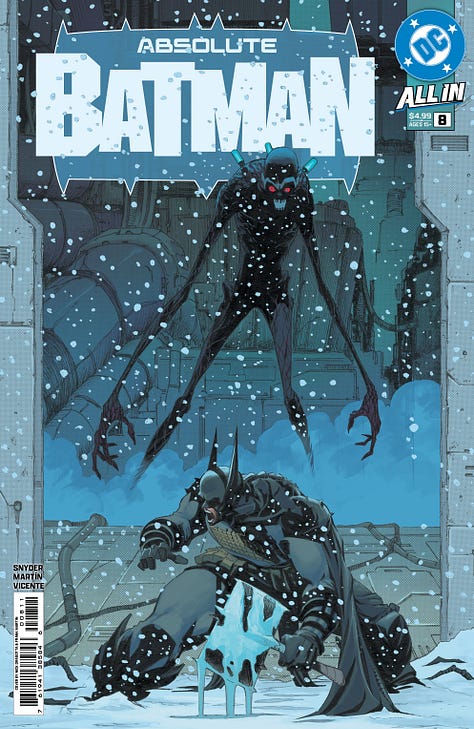
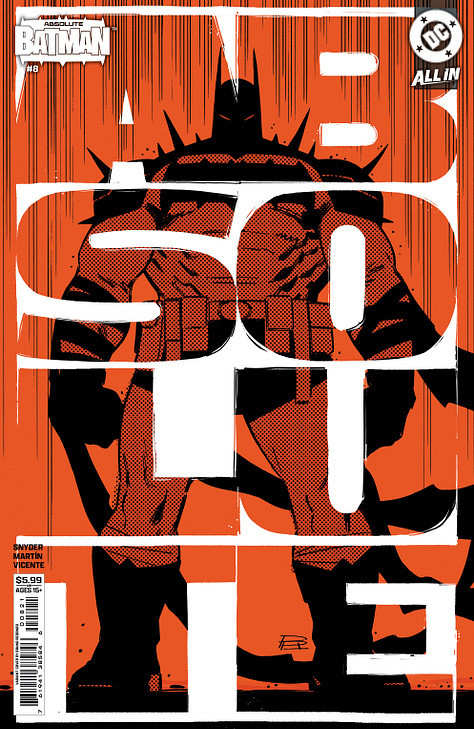
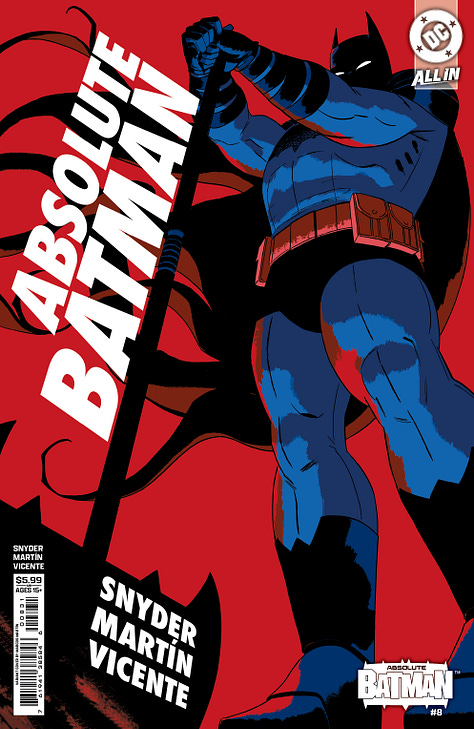
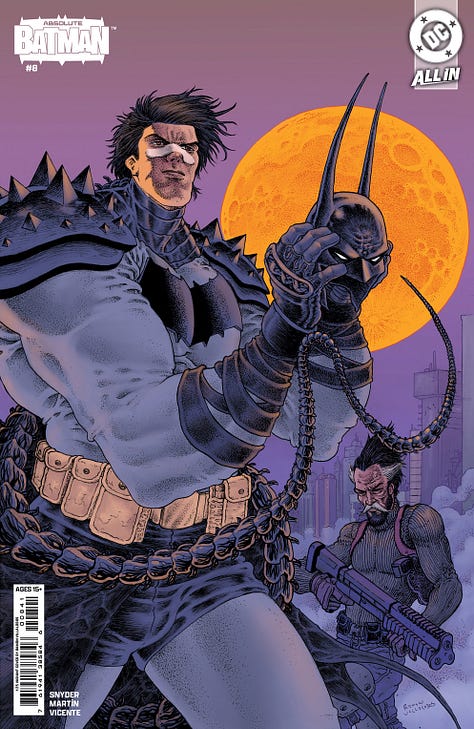
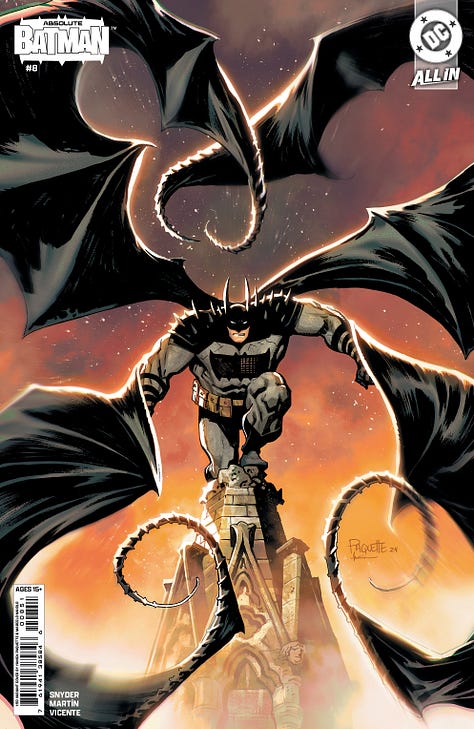
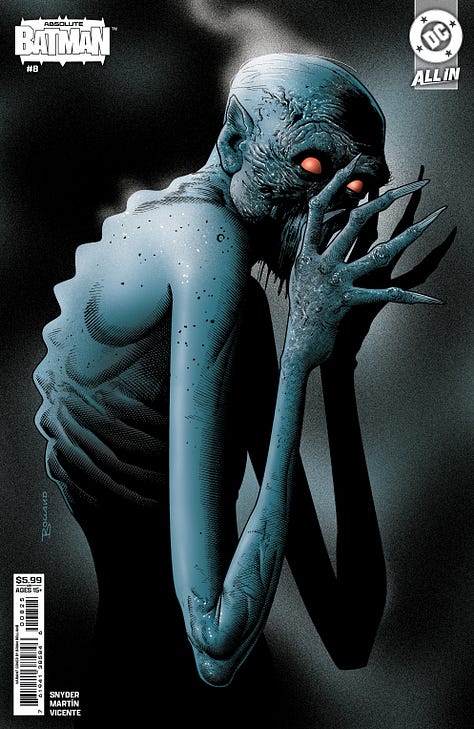
This is the conclusion to the mini-arc about Mr. Freeze and it's got a big moment at the end that sets up everything coming for our big Bane mega-arc that starts at issue #9 with Nick Dragotta coming back. So I hope you'll check it out! Again, Monday is your very, very last day to order. Please order today from your local shops or over the weekend. Don't wait until the last minute. Again, a lot of these issues have been selling out, pretty much all of them. So we're really, really hoping that you'll put in your order early so you don't miss out. We're super proud of everything coming up. Some of our best issues are this and what's coming next.
Anyway, so a couple other things. Happy Superman Day! I hope you go out and celebrate. We'll put a list at the bottom here of some of my favorite Superman books. He's a character that I can't wait to write again someday. When I got to write him on Superman Unchained, I was pretty young at DC and to get to work with Jim Lee was super intimidating and incredibly thrilling and a huge honor. So I'm really proud of what we were able to do.
But with the pressure of all of that and Batman running at the same time, I've been eager to get back and do a Superman story at some point. So I have some thoughts on doing something soon. Also exciting news, we're going to do a livestream, our first one of 2025, next week. We're going to try it out on Monday night at 9:30pm This first one will be open to everybody. So you can come, you can ask me anything. We're going to try and do this in general when an issue of Absolute Batman comes out, the night that it comes out, try and make it a monthly thing. Eventually it'll be for paid subscribers, but right now we'll try this first one where really anyone can come ask anything. So very excited. It could be a total mess, but we'll give it a shot. Tyler, best assistant in the world, is awesome for shouldering this one. So that'll be Monday.
And then the week after next, we're going to do a class. And the subject of the class is what I wanted to talk about today, because I'm really interested to get your take. I've been thinking a lot over the last few weeks, especially with this consulting gig at DC, about the state of comics right now and the craft of comics in the context of this moment. And it feels like there's two things going on at once in comics. And I think there’s a lot to talk about in relation to these two things, but the first thing is it’s a moment of tremendous economic anxiety on a macro-level. We have tariffs that people are worried about. We have inflation. We have a trade war going on with China where a lot of books are printed, a lot of books are printed in Canada or Mexico. So there are a lot of big tectonic things happening that are largely out of our control that are worrisome. And then there are also things like Diamond's bankruptcy. And so it's a moment of tremendous economic anxiety on sort of a 30,000 foot level for comics. The other thing that's true is it's also a moment of tremendous economic ascent and creative ascent in comics. So for example, these two things can be true at once. So companies can be very worried about the future and worried about the market and at the same time be experiencing a lot of success right now on both financial and creative levels.
So for DC, for example, we had a great last quarter of 2024. We're having a fantastic first quarter of 2025. Things are going so well, in fact, that we're beyond any budget that we had hoped to hit this early in the year. But we're almost approaching, or maybe even surpassed at this point, the goals that we had for 2025 in general. So we're really happy with how things are going sales-wise. And we're really happy with how things are going creatively. I think it's a moment when not just at DC, but across the board, you're seeing creator-forward comics really succeeding. And what I mean by creator-forward comics is books that feel like they're created organically out of the interests and passions of the creative team without tremendous editorial oversight. For me, great editors absolutely are crucial to comics. They guide the story. They help with every aspect, sometimes, of honing what that story is going to be. But what they do, first and foremost, too, is encourage creators to take their biggest swings. And I think we're in a moment right now where you're seeing that at Image and Marvel and DC and IDW and a lot of other places. And you're seeing books have overwhelming success when they sort of follow those tenets. And we certainly plan on following those this year at DC into next year. So I'm very, very excited about a lot of our plans.
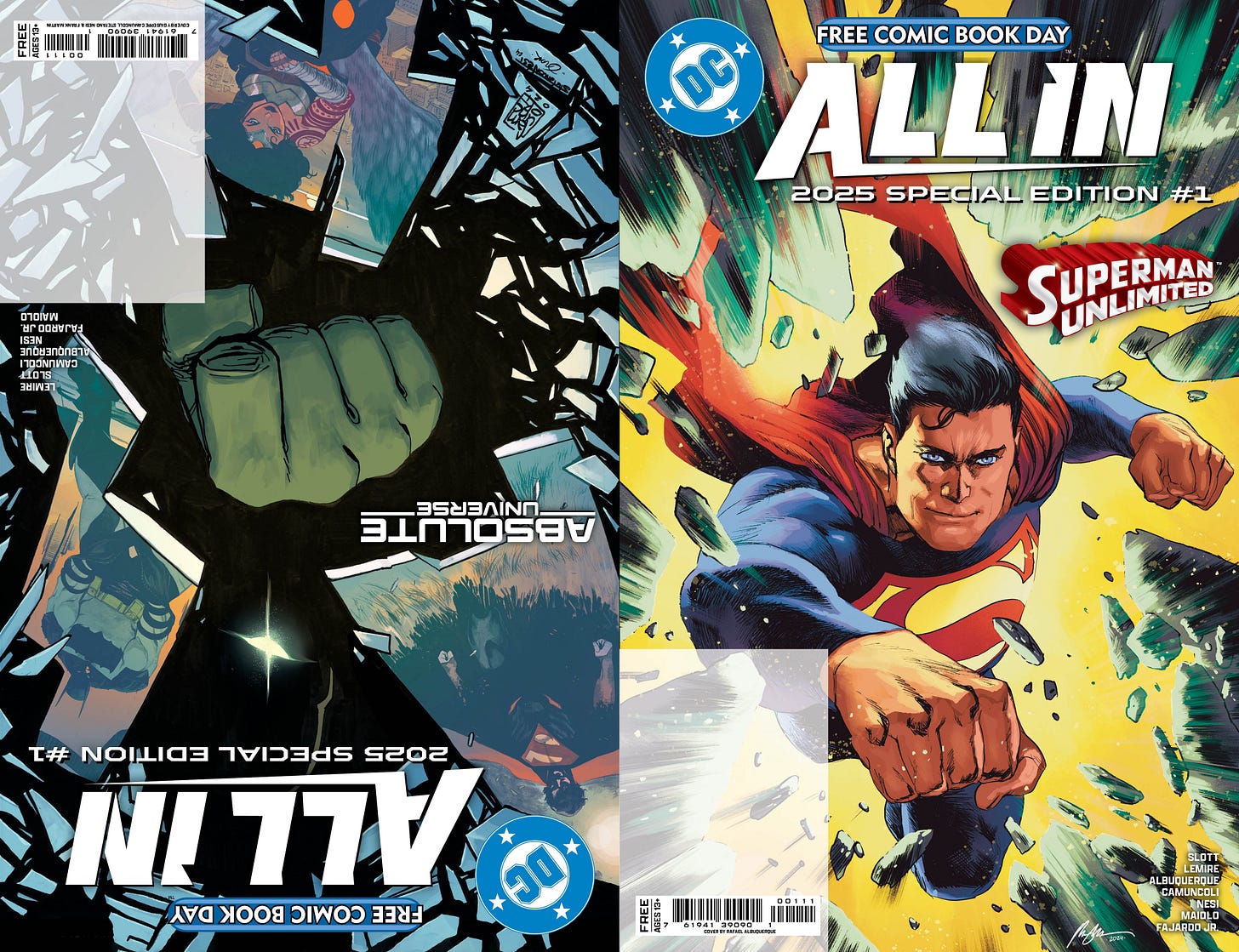
So these two things can be true at the same time, in my opinion, right? You've got this strange double helix. You've got this one strain of economic anxiety and cultural anxiety. And then on the other hand, you have creative and economic success that's really genuinely happening in all these kinds of places around the industry. So what do we need? What lessons can we take from this? And there are a lot, if you ask me what we need right now in comics. There are many things, right? I think a lot of it stems from honesty. I think you're going to find in moments of anxiety, a lot of people trying to create clickbait narratives on both sides of positive and negative interpretations of what's happening. So what you'll find is some people talking about how everything is fantastic and everything is going great and I don't find that particularly helpful. And then on the other hand, I think you'll find plenty of people talking about how everything is failing or how sales are in the toilet or how everything's going to collapse. And again, I just think what's important is finding a truth about what we're really facing in the industry and dealing with it head on with determination and enthusiasm for the things that we can do because there's tremendous opportunity in moments like this as well.
When the market gets boiled down, in my opinion, to just the comic market, you have less things inflating it. You don't have the variant market the same way. Streaming isn't as powerful as it was a few years ago. All of these things that push comics up not in fake ways, but in ways that sort of add this extra cushion, are not there, then what you have to do is return to the things that really make comics great. And so for me, aside from all those other things I mentioned about being constructively critical and not critical in a way that's just toxic, or being supportive, but supportive in a way that's honest about the books you really think are doing something special, about the books that you're really enjoying, supporting those creators, all that kind of stuff in a way that's honest and not sort of like, “everything is awesome.”
Besides that, this is a craft Substack, right? We do a class, Comic Writing 101, that's all about craft. And so what I'm focusing on, and what I'd like to do this class about and have a series of classes about, is comic book writing fundamentals. Because what I'm seeing a lot of is comics from students and comics out in the market as well that to me have tons of promise and have a lot of strengths. And I see a lot of creators coming in, especially from other medium, and doing comics that, again, are probably head and shoulders better than the comics that I was doing when I first came into the industry. But there are also some things that I think are almost like, aspects of storytelling that come from our immersion in a streaming culture and in a webcomic culture and things that are maybe not best suited for the serialized monthly comic book format. So, for example, I think with streaming, one of the things we really take for granted is the fact that all of the storytelling that we swim in day in and day out constantly is subscription-based. So when you have a subscription to Amazon or you have a subscription to Netflix, You're not buying the episodes episode by episode anymore, right? They have you baked in. You have the entire series at your disposal and they know that. So the storytelling priorities are going to be different. They don't need every single episode to catch you all over again.
And again, this is not qualitatively saying that one kind of storytelling is better than the other at all. It's just saying how some kinds of storytelling are adaptive to different medium, right? So in streaming, because they have that format where you've already bought the entire thing, you can create a show that has more oxygen that can be, especially in the heyday of streaming a few years ago, about showing off how big it can be, how spacious it can be, how immersive it can be, to show the budgets that they have, to show how they can compete with network shows and with movies and all of this stuff. And they don't necessarily need you to be like, “God, that episode made me have to buy the next episode. I have to go to the next one.” It can be a little bit more experiential. You can wander through it differently. You can have different priorities is my point. But especially in this kind of market with comic book storytelling, there's some things that I feel are really special about the way we get to tell stories and our relationship to our audience.
It’s about creating a very big moment that redefines your series, defines your character, shows why that character is awesome, shows what you're going for, what the whole series is trying to say every single issue so that people come back and say, “God, that issue just reminded me why I love this, but also surprised me.” Making sure that you catch people up in certain ways, even if it's really subtle. Trying to do things like cliffhangers, creating arcs that have plenty of space to be multi-layered and multi-faceted and immersive and all of that. But also that feel propulsive, that feel like you're not telling incredibly decompressed storytelling where you pick up an issue and it feels like these three issues could be one issue.
And that doesn't mean that everybody has to do super compressed, dense, kinetic storytelling. I'm not saying that. But I'm saying, look at your story and say to yourself, “am I telling this in a way that I think best suits this medium and what I'm trying to do?” Because sometimes those things can be a little bit misaligned. And in the Venn diagram of all of it, it's like you're hitting one of the things that you thought you were hitting in all three zones, right? So it doesn't mean every comic has to hit every point either. Like, I'm doing issues right now in Absolute Batman #7 and 8 that have slightly different priorities as we slow things down a little bit and try and pierce some of the stuff that Bruce is really going through internally, giving him narration, all of this kind of stuff that we don't do in the main arcs. So you can create texture by adjusting the knobs on these priorities each arc. But what I'm saying is I think it's important to learn them and understand them as the kind of expectations and the general priorities of Western comic book storytelling.
So I'd like to kind of do a series of classes that are about these fundamentals and talk about some of the stuff that I think isn't necessarily missing from comics right now, but that we'd be good to be reminded of. And me too. It's about me reengaging with my own principles about it on a craft level as well. So I'm really excited to do it. That will be the topic. It'll be the first few things like creating a big moment, making sure each issue redefines your series for your readers. That might be the very first one that we'll do the week after next.
But I'm really curious to hear what you think, that if you think that comic books right now, as good as they are, and again, I think we're in a great moment creatively. And I think we're in a great moment financially given a difficult market, like, an honestly difficult market, with tremendous potential to grow over the next couple of years if we keep following the right priorities about letting creators tell stories that matter to them, going big, taking risks, but staying true to our core values, all of that stuff I really believe in. But I'm very curious to hear what you think. So please comment here, DM, write. I really want to hear what your feelings are on all of this. And thanks again. And yes, please order Absolutely Batman #8 and go enjoy Superman Day at your local comic store!
Scott’s Favorite Superman Stories:
The Last Days of Superman by William Woolfolk and Al Plastino
The Showdown Between Luthor and Superman! by Edmond Hamilton and Curt Swan
Superman: Last Son of Krypton by Elliot S! Maggin
Miracle Monday by Elliot S! Maggin
Superman and Swamp Thing: The Jungle Line by Alan Moore, Rick Veitch, Al Williamson & Tatjana Wood
The Dark Knight Returns by Frank Miller, Klaus Janson & Lynn Varley
The Man of Steel by John Byrne, Dick Giordano & Tom Zuiko
Superman: Whatever Happened to the Man of Tomorrow? by Alan Moore, Curt Swan, George Pérez, Kurt Schaffenberger & Gene D'Angelo
Kingdom Come by Mark Waid and Alex Ross
Superman: The Animated Series by Alan Burnett, Bruce Timm, Paul Dini, Stan Berkowitz, Rich Fogel & Various
Superman Adventures by Paul Dini, Rick Burchett, Terry Austin & Various
DC One Million by Grant Morrison, Val Semeiks, Prentis Rollins, Jeff Albrecht, Del Barras & Pat Garrahy
Hitman: Of Thee I Sing by Garth Ennis, John McCrea, Garry Leach & Carla Feeny
Emperor Joker by Jeph Loeb, Joe Kelly, J.M. DeMatteis, Mark Schulz & Various
What's So Funny About Truth, Justice & the American Way? by Joe Kelly, Doug Mahnke, Lee Bermejo & Various
Superman: Red Son by Mark Millar, Dave Johnson, Andrew Robinson, Walden Wong, Killian Plunkett & Paul Mounts
Superman: Birthright by Mark Waid, Leinil Francis Yu, Gerry Alanguilan & Dave McCaig
Superman: Secret Identity by Kurt Busiek and Stuart Immonen
All-Star Superman by Grant Morrison, Frank Quitely & Jamie Grant
Superman: Brainiac by Geoff Johns, Gary Frank, Jon Sibal & Brad Anderson
S

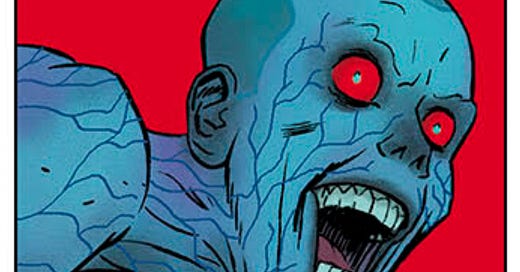


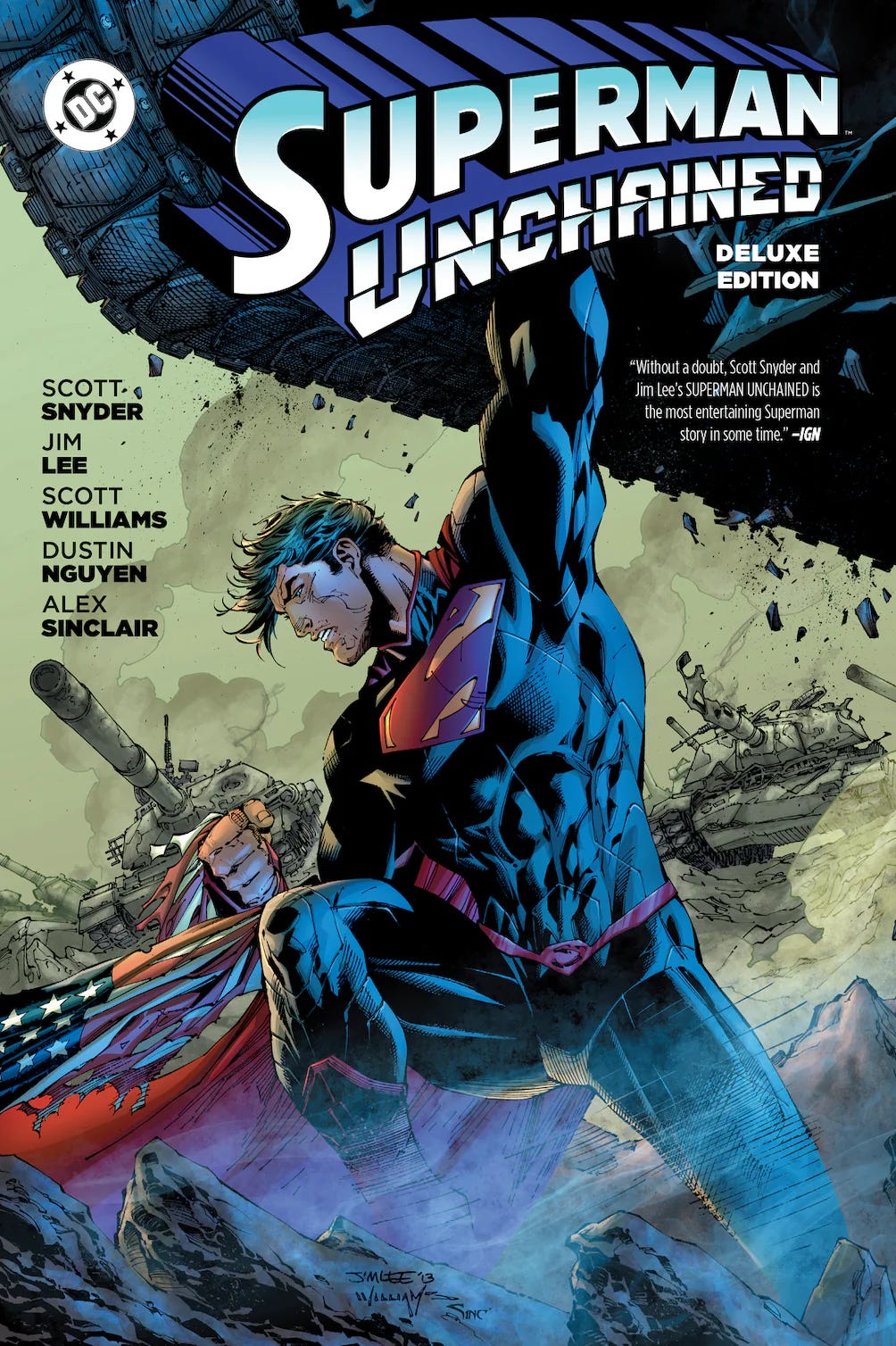



Share this post